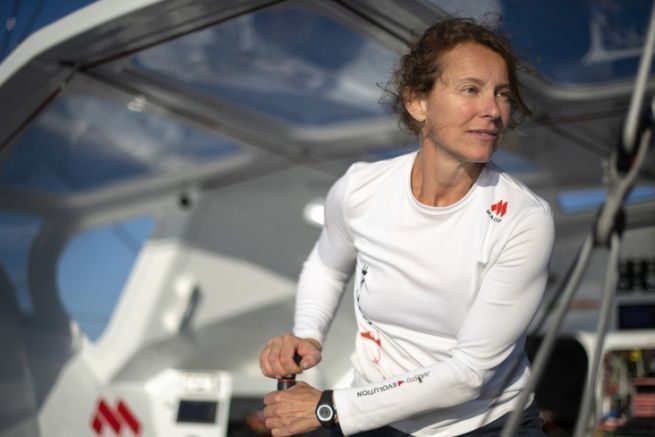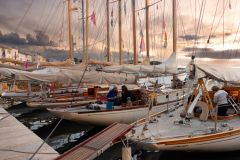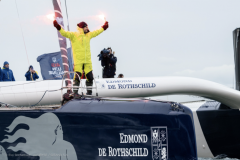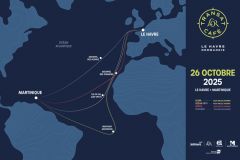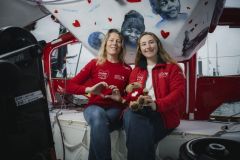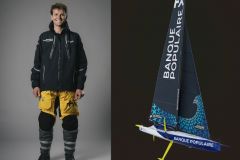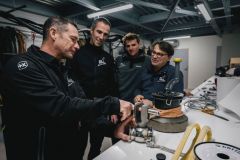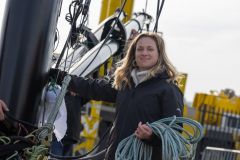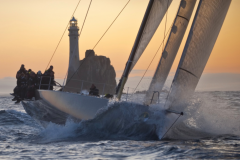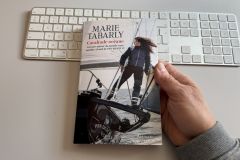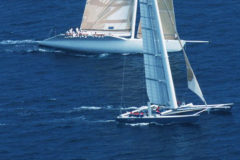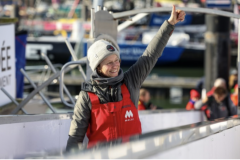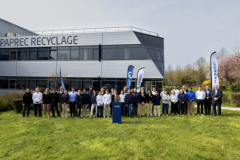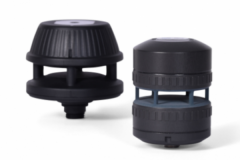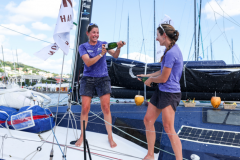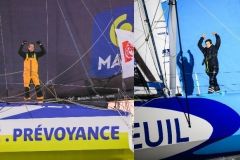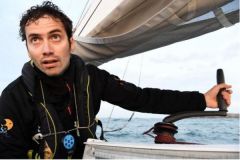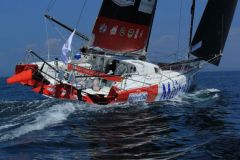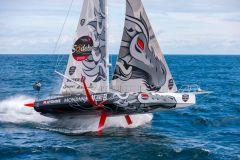With less than a month to go, what is your state of mind?
I am very happy to leave, and to leave with Fabien ( Editor's note: Delahaye ). To leave on a season which does not resemble at all the last one ( Editor's note: Last year, the IMOCA competitors took part in the Vendée Globe ). It took a lot of energy, it was very demanding and it gave us a lot.
This race brings something new. It's fresh, lighter because I'm sailing double-handed. It's physically less impactful. Fabien gives me a new perspective on my boat. It forces me to change my outlook and my habits. I'm at home on board and we're putting new things into everything. I'm learning new things with someone who doesn't know my boat, but who does know this kind of boat.
I'm very happy and I can't wait to go. I haven't sailed much this year. There was the Fastnet and the Azimuth Challenge, but I also saved myself to let the motivation, the desire, the form come back.
What are your ambitions for this Transat Jacques Vabre?
Fabien has been helping and coaching me since 2018. He helps me to work on performance, to know my boat better as a perfomer. I have the feeling and the experience and he comes with tools to go a little further.
The idea is to gain skills thanks to his experience as a performer and racer. To learn new things and to clearly perform, which is not easy in the Transat Jacques Vabre with the field we have.
The goal is to leave as many foilers behind as possible. The boats more recent than ours are our direct competitors. Prysmian, Maitre Coq... are 2016 generation boats. Beside them, our boat has already done the Vendée Globe 4 times!
We're going to stay in the game with these boats. It's ambitious, because they are newer and therefore have advantages that we don't have. But Fabien is a very good teammate. We're going to be proud of ourselves and give it our all.
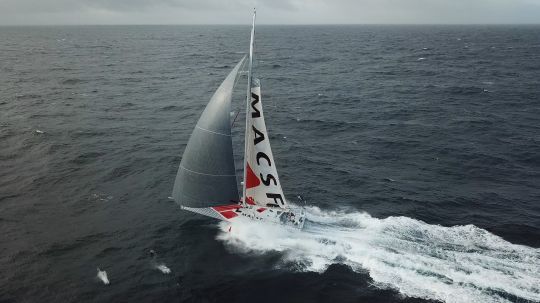
What was the work on MACSF after the Vendée Globe?
We went over the boat with a fine-tooth comb. We have made it more reliable, revised and optimized small things. Today we're leaving with a more detailed preparation, which we missed in 2020. But the boat's potential is the same as before the Vendée Globe.
Can you tell us about your co-skipper, Fabien Delahaye, and this choice?
He knows a lot of different boats. He is eclectic. He has sailed in the Figaro, participated in a round-the-world race with Dongfeng, sailed in the IMOCA, the Multi50... He brings me a lot of things from that point of view. He is also very pleasant to be around, always has a smile on his face, and is always positive.
What are the constraints and advantages of a double-handed race format compared to solo racing?
The constraint is potentially to disagree on a big strategic choice and to have to compose. You also have to accept making a choice that is not your own. It's not as easy to agree with two people as it is to agree alone. Another constraint, which doesn't happen every time, is when you make bad moves, when an option doesn't pay off. It's easier to be disappointed in your own corner than with two people, because you are responsible for the other.
But there are mainly advantages. I am happy with my duo. We have a richer view of the situation, we exchange our points of view, we also change our point of view. It takes me out of my habits. It gives me freshness.
For the physical side too. The maneuvers are easier and faster and less demanding with two people. The race is somehow punchier. You get through things faster. When I'm sailing single-handed, when I choose a sail, I do it for a while, because the maneuver is tiring. In solo sailing, there is a notion of medium and long term management. In double-handed sailing, we are much more in action than in management. It's good to alternate seasons of solo and double-handed sailing.
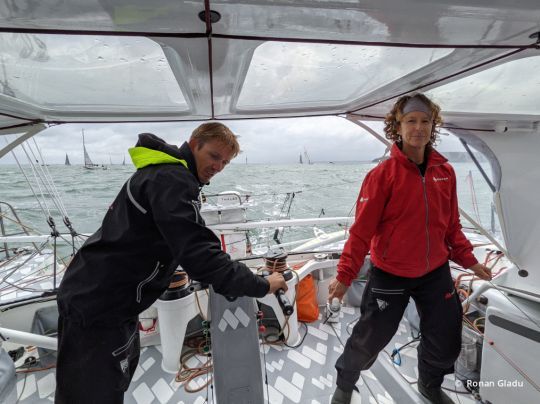
What do you think of the new race courses? What will it change?
I would say that mainly, apart from the finish port, you pass the doldrums twice. It is a difficult place where there is either no wind or too much wind. It's this randomness. You have to get to the right place to avoid getting stuck in the doldrums. You can lose places, that's what happened four years ago.
It's very energy consuming to pass a place like that. At the same time the dice will not be played after the first pot in the dark. This will allow a very open game for a while.
What's great is that we've kept a course that goes south, towards Brazil, even if we go back north afterwards. This opens up the game strategically and there is more variety in the conditions encountered. It's not just about being pushed into the trade winds. We're going to encounter a lot of different conditions. We're going to pass the Equator, which is also nice.
How do you feel about the competition, both in personal and material terms (boat)?
The field this year is incredible. In the Vendée Globe, some of the boats withdrew fairly quickly from the race. New boats with great potential like Corum and Arkéa-Paprec. There are boats that were not present on the round the world race like the 11 th Hour Racing, but which are very fast.
It's an exceptional line-up, so it will be a little less easy for MACSF to compete with the latest generation boats. In any case, it's great to have a great line-up. It's a great way to keep the competition going, which wouldn't be the case if there were fewer boats. It's more fun.
In the Vendée Globe, I was able to tell myself that I would finish in the top five. Here, it's not possible. We're going to leave as many foilers as possible behind, and take this line-up into account and take it as a positive.
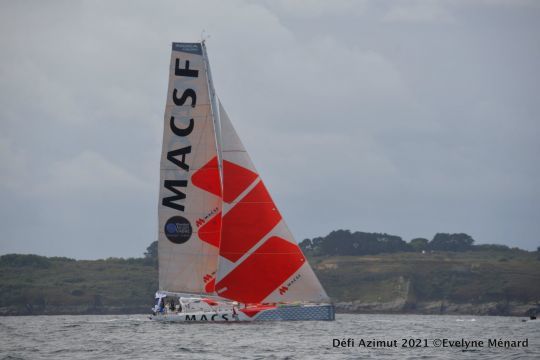
After the Transat Jacques Vabre, what are your plans?
The first thing is to bring the boat home on a return trip with a crew. Then we're going to do some work on the boat. We're aiming to take part in the Vendée Globe 2024 and we'd like to make a few changes. The season will start early with the Bermuda 1000, then a few weeks after the VALS (Vendée Arctique Les Sables-d'Olonne) and then the Route du Rhum single-handed. In double-handed racing, everything is lighter, everything is less heavy. You have to be in good shape at the beginning of the season, as sailing costs a lot of energy.
